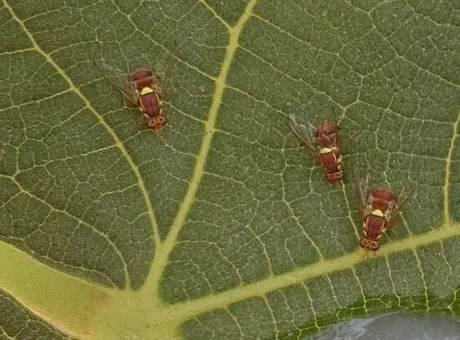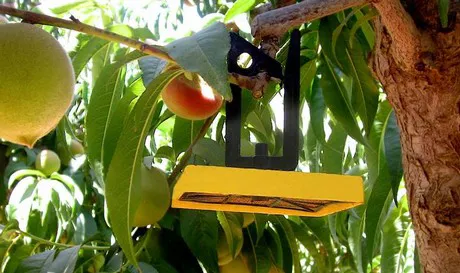Dr Shakir Al Zaidi of Russell IPM explains, “fruit flies are a big problem because they attack the fruit at the ripening level, which limits the amount of pesticides that can be used for control.” Another issue is that current methods of control are expensive and small growers cannot benefit from them.

Dr Al Zaidi affirms that consequently, their goal was to find a suitable solution for the problem on a small-scale level, without resorting to spray, thus allowing for a residue-free production. “We looked at current technology on the market, and we reached the conclusion that the solutions available were all just half solutions, not providing the control the grower needs.”
“We made a few discoveries,” continues Dr Al Zaidi, “and based on that, we developed a system of attracting and killing the male and female separately, using a dispenser, and we saw an improvement in the performance. The best results have been achieved by attracting the males at the edge of the farm and the females at the centre, as the males usually arrive first.”
The implementation of this new innovative system has made it possible to reach a 95 to 97% protection rate without a single chemical spray application. “Currently our best system requires 200 pieces per hectare, which we aim to reduce to 50 around the border and 100 within the hectare, and this single application could work for up to four months,” explains Dr Al Zaidi. “It’s a very simple technology, but it makes a huge difference.”

The system has already been tested on peaches and citrus in Tunisia, citrus in Turkey, apricots in Iraq, peaches in Jordan, mangoes in Saudi Arabia and this year trials will also be conducted on citrus in Iraq. “In Egypt we have a very interesting situation, as there is a clash between the Ceratitis capitata (from the north) and the Bactrocera zonata (from the south), and in parts with a mixed population, control becomes very difficult. We tested the solution in an area where both are fighting for dominance and we achieved a fantastic result.”
Performance is also good against the cucurbit fruit fly and could technically be used against any other fruit fly species by changing the male-specific attractant, which, according to Dr Al Zaidi, is the reason the British Government’s innovation agency, Innovate UK, is funding demonstrations of the concept in four countries: Tanzania, Kenya, Bangladesh and Nepal. “The goal is to provide a solution that will allow small growers to access the export market, but it is not limited to them, as it will also allow for better control in larger farms.”
Russell IPM is happy to provide any interested growers, exporters or cooperatives around the world with the necessary material to test the system on one hectare, along with a protocol and advice for its application. “We will also talk with them about the future commercialisation of the product in their countries,” concludes Dr Shakir Al Zaidi.
For more information:

Russell IPM
Shakir Al Zaidi
info@russellipm.com
www.russellipm.com
